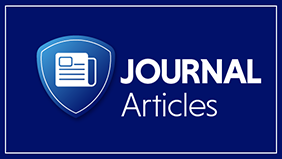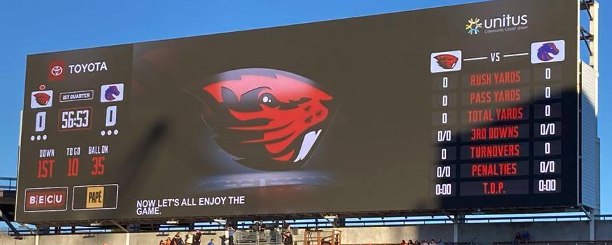
Game Changers: Navigating Audits during Athletics Transformation
Publication Date: November 15, 2024
By Rachel Flenner and Will Aurich (ACUA Sidelines Committee)
Just as athletic scoreboards are transforming to become bigger and brighter, auditors need to continue to transform our focus to shine in the right direction. When we think of athletics risks, the first thing that often comes to mind are the high-profile court cases with the National Collegiate Athletics Association (NCAA). However, athletics is not immune to the risks we evaluate elsewhere on campus. The risks in the athletics environment are often heightened due to the high volume and visibility of expenses and unique positioning of the student-athletes. Athletics houses some of your university’s highest payroll and travel expenses, and heightened student-athlete welfare and privacy concerns are now in the limelight. Apply your university and audit knowledge to the following athletics risks to keep the scoreboard flashing wins.

The University of Minnesota marching band and classic scoreboard
Photo credit: University of Minnesota Library
Transformation of Expenses
A 2019 Forbes article reported that 15 of the 69 universities in the “Power Five” conferences spend five times more per student-athlete than regular full-time undergraduates, and these expenses are growing. If your audit office has not reviewed athletics expenses recently, it may be time to do so. The good news is you can easily apply your university audit skills to athletics.
- Documentation and Purchasing Procedures: All athletics expense documents should be held to your institution’s standards and properly justified. Purchasing should follow the bidding and procurement requirements for other university units.
- Food: According to the Forbes article, over five years ago 20 institutions were spending well over a million dollars annually to feed their student-athletes. From an audit point of view this raises several risk topics:
- Food procurement and contracts, such as sourcing, supplier selection, and contract adherence.
- Purchase methods including cash advance, credit cards, reimbursement, etc.
- Meal allowances and per diem for appropriate rates, thresholds, and monitoring.
- Travel: With the frequent travel schedule and widening of conference boundaries, auditors should verify if travel expensing adheres to the institution’s travel policies. Some areas specific to athletics travel include:
- Allowability of business class or first class for coaches on recruiting trips.
- Whether travel by a private or university owned jet is allowed.
- Family member travel attendance expense limitations and potential IRS reporting requirements.
- Hospitality: Athletics frequently hosts recruits and donors, and these dinners and events can push the boundaries of an institution’s allowances as the pressure in athletics to keep up with the next school is extremely high. Auditors should also examine the reasonableness of the donor-to-staff member ratios.
- Payroll: Coaching contracts can be very complex, including items such as salary, performance-related bonuses, memberships, vehicles, and other fringe benefits. Today not only are head coaches’ salaries increasing, but those of assistant coaches are too. Internal audit can help ensure an institution’s general counsel is involved with coaches’ contract language, verify bonus payouts meet the contract expectations, and monitor the use of other benefits included in their contracts.
Transformation of Privacy
While privacy regulations are not new to auditors, we must think about the growing prevalence of student-athlete data and the risks of widespread exposure. Additionally, in a competitive recruiting environment, there is a heightened interest by the public, scouts, competitors, and agents to obtain student-athletes’ private data.
- HIPAA/PHI: Student-athletes are not only being seen by doctors and athletic trainers, but are also receiving assistance from mental health professionals, massage therapists, and chiropractors, while also undergoing recurring drug testing. These services result in a large amount of student-athlete personal health information that must be protected. Auditors should review:
- Medical data sharing with outside organizations and medical professionals, and whether it follows your institution’s policy or best practice.
- Training and education of athletics staff on what is acceptable to share via different electronic mediums (Gmail, Outlook, MS Teams, Slack, or other information sharing tools) and acceptable ways to store data once received (systems, drives, etc.).
- Internet of Things: Paper and clipboards are things of the past. Nowadays student-athletes wear devices that track their daily movement and key health metrics. Coaches are recording practices, and all this information is being carried around on iPads and other devices. From an audit perspective, consider:
- Whether all electronic devices are secure and up to your university’s standards.
- Whether athlete recording and monitoring is limited to only scheduled practices, and that the student-athlete is not being recorded without his/her knowledge.
- Where other student-athlete private information may unexpectedly or unnecessarily appear, such as travel/flight manifests, invoices from providers, social media, etc.

The modern Oregon State University scoreboard
Photo credit: Nick Daschel, The Oregonian/OregonLive
Transformation of Well-Being
Scoreboards went from simply displaying the team score to displaying the jersey number of the player who scored, and now to replays and flashing pictures of the scoring athlete. The focus on the student-athlete has significantly increased and we are seeing a transformation of student-athlete welfare. While some changes are a result of court cases (e.g., Alston v. NCAA and House v. NCAA.), others result from NCAA regulations known as Student-Athlete Core Guarantees, while others simply stem from institutions seeing the need for increased awareness and spending in key areas to promote holistic student-athlete health. Areas that could be audited include:
- Alston Awards: A university is now allowed to pay a student-athlete above and beyond the full cost of attendance, but it is capped at $5,980 per athlete. However, each institution can choose how to award Alston payments. Auditors could review the award distribution for consistency with their policies and procedures. Note this structure could be impacted by the recent House v. NCAA case.
- Core Guarantees: While institutions have often provided their student-athletes with access to various career and academic services, the NCAA put in new core guarantees for D1 schools effective August 2024. These new core guarantees include life-skills training and education in various areas such as Name, Image and Likeness (NIL); nutrition; financial literacy; mental health; Diversity, Equity and Inclusion (DEI); sexual violence prevention; and transfer requirements. Your institution may need to secure more resources to develop and conduct this training. Additionally, your institution may engage a third party for these services (e.g., mental health professional), and Internal Audit can review these contracts.
- Travel: Many institutions are experiencing conference realignment and changing conference boundaries. This can result in increased travel and longer travel times for student-athletes, which pose potential risks to academic performance and mental health.
Transformation of Compliance
For several years it has been considered a best practice to have an independent, external review of a university’s athletics compliance program. These often come in the form of recurring reviews by a contracted firm or the university’s internal audit function. Currently, such reviews are not required but do assist towards demonstrating institutional control and ensuring an effective compliance program. Upcoming updates to Division 1 Bylaw 20, effective August 2025, will require the completion of a compliance review at least once every four years and an attestation to its completion. These reviews must:
- Involve an authority outside of the athletics department.
- At a minimum, consider areas integral to serving the needs of student-athletes (to be annually determined by the NCAA Legislative Committee).
- Have findings shared with the institution’s leadership and athletics director.
Additionally, the House v. NCAA case has started to change key NCAA regulations such as National Letters of Intent (NLI), transfer eligibility, scholarship caps, and roster limits which will change our audit focus.
Transformation of Revenue
The athletics revenue landscape is transforming, too, as conferences realign and new or increased revenue sources are needed to match growing expenses. Dollar signs are flashing everywhere, and everyone wants to be part of the action. Internal audit can add value by helping ensure universities are getting the dollars they are owed.
- Media Rights Contracts: Revenue from athletics often comes from media rights agreements and conference agreements. Over the past decade we have seen an upheaval in these media rights as streaming services have begun to gain market share and compete with, or outcompete, traditional cable and satellite television. As court cases continue to pend and be resolved, there are emerging contingencies that could alter this revenue mix, including student-athlete revenue sharing agreements.
- Concession Contracts: Many universities are outsourcing stadium concessions, potentially leading to more contract revenue. Like other third-party contracts around campus, audits can ensure that the concessions sales are providing the correct revenue and adhere to terms and conditions. Additionally, these concessions may be the only or highest volume sources of alcohol sales at your university. Alcohol sales come with increased risk, such as underaged serving. Internal audit can verify alcohol is purchased, stored, inventoried, and served in accordance with university policy.
- Ticket Sales: Another vital revenue source is ticket sales, which hve primarily moved from hard copy paper tickets into an electronic format. Ticket prices will vary by cost based on their seat, and university employees may get discounted or free tickets. Internal audit can help ensure ticketing policies are followed, especially for complimentary tickets, and reconcile the accurate recording of ticket revenue. Auditors should also verify sufficient planning for e-ticketing outages and system recovery is in place.
While we cannot predict the future of the evolving world of athletics, we can provide assurance over existing controls and help prepare for future risks on the horizon. As the world of athletics continues to transform, and athletic scoreboards grow bigger and brighter, auditors must continue to know the risks in athletics and apply their exceptional institutional and internal control knowledge. No one wants to be flashing on the scoreboard for the wrong reasons.
References:
NCAA Student-Athlete Core Guarantees
Knight-Newhouse College Athletics Database Custom Reports
Power Five University Spend – Forbes 2024 article
Article: D1 College Athlete Diets and Spending – Forbes 2019 article
These 20 Colleges Spent $40 Million Just to Feed Student-Athletes – FanBuzz
How 3 Companies Put Health at the Heart of the Workplace – Forbes 2024 article
About the Authors

Rachel Flenner – Rachel graduated with a degree in Accounting and Business Communications from the University of St. Thomas (St. Paul, Minnesota). She obtained her MBA at the University of Minnesota at the Carlson School of Business. After a start in public accounting, she became an
internal auditor at the University of Minnesota where she has held various titles, currently Audit Director, for over 20 years. She also holds CIA and CRMA certificates.

Will Aurich – Will is a senior auditor with the Office of Audit, Risk and Compliance at Oregon State University and has worked in internal audit since 2018. Will holds a Bachelor of Science in Accounting from OSU and a Bachelor of Science in Business Administration from Excelsior College. He also earned a Master of Science in Accounting with a focus in forensic accounting from the University of Massachusetts. He is a licensed Certified Public Accountant (CPA), a Certified Internal Auditor (CIA), and is currently pursuing the Certified Fraud Examiner credential.
From This Issue
- Professional Skepticism
- Improving Communication by Reducing Ambiguity in Policies
- Going back to basics: Higher education internal audit challenges, risks and strategies
- Auditing Campus Space Utilization
- Understanding the IIA’s Proposed Topical Requirement for Cybersecurity
- Navigating the Update: Implementing NIST CSF 2.0 in Higher Education
- ACUA Committee Updates – Fall 2024
- ACUA 2024 Award Winners and Board Members
- Letter from the President – Fall 2024
- Letter from the Editor – Fall 2024
